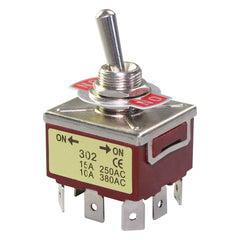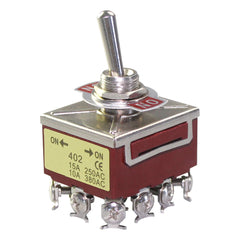A Complete Guide To Understanding And Using Toggle Switches
A toggle switch is a simple but effective way to control the flow of electricity in a circuit. In its most basic form, a toggle switch is a mechanical device that can be used to turn a circuit on or off.
In this guide, we will explain everything you need to know about toggle switches, including how they work, the different types available, and the contact configurations you can choose from.
What Are Toggle Switches?
Toggle switches provide an easy-to-use and reliable option for controlling circuits. These components feature a handle, lever, or hinge mechanism -- known as a toggle -- that connects and separates two contacts at the endpoint of the circuit.
When connected, this allows electric current to flow through, allowing any attached device to be powered on. On the other hand, the interruption of current when disconnected results in a device being switched off.
Toggle switches are indispensable for electrical systems due to their simple yet effective system of enabling on-off control.
Toggle switches are widely-used actuators that serve as an on/off switch for machines. These devices are sometimes confused with rocker switches, which feature a see-saw shaped button and provide similar functionality.
Toggle switches can also be referred to as joystick switches or toggle power switches, and can be utilized for a variety of electrical applications.
How Do Toggle Switches Work?
Toggle switches, also known as momentary switches, are manual devices that can activate or deactivate a circuit. In other words, when the switch is in the "on" position, current flows through it and powers an appliance or device.
When it's in the "off" position, current cannot flow and the appliance/device is powered off. These switches have two positions: ON and OFF (while some may have more than two positions, such configurations are not common).
They require manual actuation - usually by a finger or thumb - to move between these two positions. The force used is what keeps the switch in this position until is manually moved again.
The fundamental design of toggle switches features an armature attached to the toggle that moves when it's pulled, thus placing electrical contact into a circuit (for activation) or removing it (for deactivation).
Typically, they remain in one place until being manually moved once more. However, momentary toggle switches also include an attached spring which will pull them back to their starting point once released.
Applications of Toggle Switches
Toggle switches are often used to enable/disable circuits in industrial, commercial and telecommunications equipment. They are also common in vehicles, aircraft control panels and logic-level applications.
The application range of toggle switches is extensive:
- Found in domestic and industrial power points, automobiles (such as headlights), electronic toys and fitness equipment (scale, treadmill)
- Be used as the main switch for AC or other type of industrial devices like conveyors and packaging machines
- Employed within a wide array of digital products including mobile phones, cameras, telephones and PDAs
- Feature prominently in medical equipment such as blood pressure monitors or hospital call systems
Types of Toggle Switches
With a wide array of sizes, designs, and features, toggle switches can be used in various applications. As a basic electronic component, toggle switches should be chosen carefully to ensure they meet the requirements of the task at hand.
Let’s take a look at some of the key toggle switch models:
 |
Single Pole Double Throw SwitchSPDT toggle switches are some of the most widely used switch types. A single pole double throw switch has three terminals, and it can be used to route electrical current through two different devices in either direction. This style of switch is commonly used in car engines and many other applications. Additionally, SPDT switches can be known as two-way or on/off toggle switches. For more specialized purposes, there are also three-position or three-way switches available. These can control a single device - for example, a light - from two different places. |
| Shop SPDT Toggle Switches |
Double Pole Double ThrowDPDT switches, or double pole double throw switches, have four terminals instead of the three found on an SPDT switch. So in addition to having two distinct states like an SPDT switch does, DPDTs offer a third state. These types of switches come in both on-on or on-off-on varieties, and are also referred to as four-position or four-way switches. Their versatility makes them ideal for tasks like controlling electric motors by reversing voltage supplied to the device. In short, they're great when you need a switch that can handle multiple different states. |
 |
| Shop DPDT Toggle Switches |
 |
3 Pole Double ThrowThe 3PDT switch is a multi-functional device with numerous applications in many sectors. The name stands for "triple pole, double throw," referring to the three poles and their two positions respectively. This versatility makes them ideal for industries such as audio and video, industrial control and motor control just to name a few. Of course, 3PDT switches are most well known for their use in guitar effects pedals – where they enable the operating of three separate states or signals paths – but this is by no means their only purpose. So whether you're looking to switch between different signal paths or completely bypass an effect in your guitar pedal… or if you need something to control multiple circuits in any other application, the versatile 3PDT switch has got you covered! |
| Shop 3PDT Toggle Switches |
4 Pole Double ThrowA 4PDT (4 Pole Double Throw) switch has four sets of contacts and can control four different states in a circuit. It's commonly used in audio mixers and synthesizers to switch between different sources or to route signals to different outputs. In addition to their use in audio and industrial applications, 4PDT switches can also be used in lighting controls to switch between different lighting configurations. They are also used in HVAC (heating, ventilation, and air conditioning) systems to control the flow of air and temperature in different zones of a building. |
 |
| Shop 4PDT Toggle Switches |
Advantages of Toggle Switches
There are many advantages to toggle switch, including their durability, versatility, and aesthetic appeal.
One of the main advantages of toggle switch is their durability. Toggle switches can last for many years without needing to be replaced. They are also resistant to shock and vibration, making them ideal for use in rugged environments.
Toggle switches are also versatile. They come in a variety of sizes and styles, and they can be used for a variety of applications. Toggle switches can be used to control lights, electronic devices, and even motors.
Another advantage of toggle switch is their aesthetic appeal. Toggle switches are available in a variety of colors and finishes, so you can find one that perfectly matches your project. Toggle switches can also help to simplify the design of a project as they can be incorporated into the overall aesthetic and design of the project.
When it comes to ease of use, toggle switches are also great. They are easy to operate, and their simple design means that they are not prone to malfunctioning. This makes them perfect for use in applications where reliability is crucial.
Finally, toggle switches are also cost-effective. They are relatively inexpensive to manufacture, and they are widely available. This makes them a popular choice for both industrial and consumer applications.
Overall, toggle switches are a popular choice for anyone who needs a reliable, durable, and cost-effective switch for their project. With their simple design, ease of use, and versatility, they are a great option for a wide range of applications.
Conclusion
This guide will provide you with a comprehensive understanding of toggle switches, from their constructions and design to the various applications in which they are used. If you're looking for more information on Daier's range of electrical switches, visit our toggle switch category or download our product PDF for further details.


Leave a comment